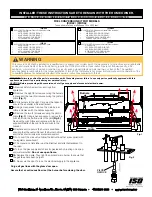
V-Link
®
-200
User Manual
3.4
Connect to Nodes
Several methods can be used in SensorConnect to establish communication with the nodes: the
automatic node discovery on the same frequency, automatic node discovery on a different frequency,
and add node manually.
3.4.1
Automatic Node Discovery on Same Frequency
If the base and node are on the same operating frequency, the node will populate below the
Base Station listing when powering on the V-Link-200.
Figure 10 - Node Discovered On Same Frequency
3.4.2
Automatic Node Discovery on Different Frequency
If a red circle with a number appears next to the Base Station, the node is operating on a
separate radio channel. Select the Base Station and then select the Nodes on Other
Frequencies tile.
18
Summary of Contents for V-Link-200
Page 1: ...LORD USER MANUAL V Link 200 Wireless 8 Channel Analog Input Sensor Node ...
Page 12: ...V Link 200 User Manual Figure 4 Viewing Node Diagnostic Data 12 ...
Page 15: ...V Link 200 User Manual 15 ...
Page 22: ...V Link 200 User Manual 22 ...
Page 35: ...V Link 200 User Manual Figure 31 DIN Rail Mount Option 35 ...
Page 45: ...V Link 200 User Manual Figure 36 Half and Quarter Bridge Wiring 45 ...
Page 76: ...V Link 200 User Manual 9 Troubleshooting 9 1 Troubleshooting Guide 76 ...
















































